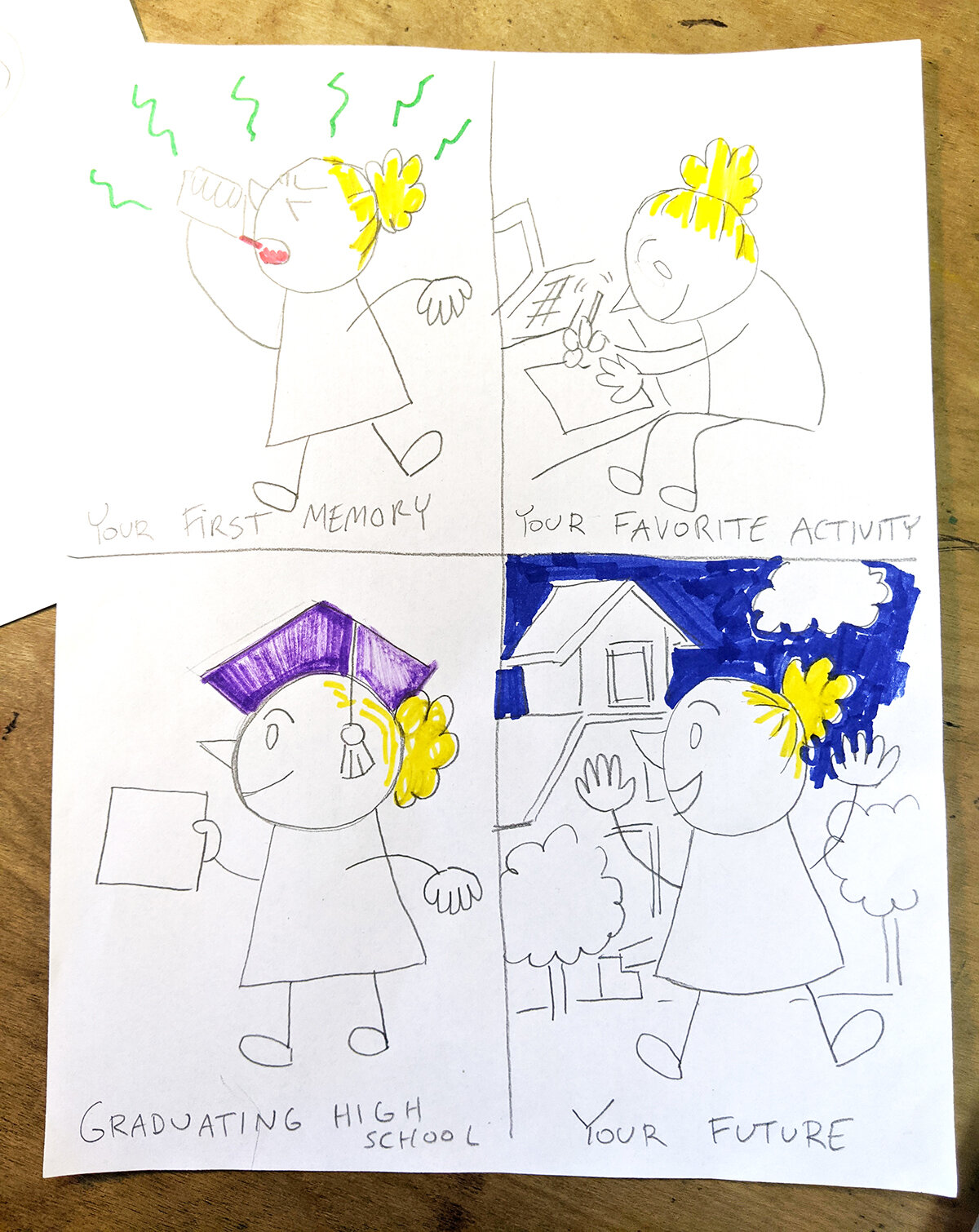In The Classroom - Life Comic Activity
Cathy G. Johnson
Here is a fun comic art activity that gets students thinking and sharing about their past, present and future! I created this project for my art enrichment after school students. I wanted students to think about their goals and their future, particularly with a hopeful attitude, since the pandemic has been harsh and difficult on developing kids.
The example I created while working with students. The addition of markers and coloring is a great way to add time for students who may complete a panel early and need to wait for other students to catch up!
Life Comic, an Elementary + Middle School Comic Art Activity
Materials List:
white paper, 2 sheets
pencil
markers
Lesson Plan:
Screenshot of my example for students while in-progress.
Practice drawing a simple self-portrait. On one sheet of paper, have students practice drawing a self-portrait using simple shapes: a circle head, triangle for the body, stick arms and legs, and a simple face. I also included some hair detail as a defining feature. I used Lynda Barry’s book Making Comics as an inspiration, who in turn was inspired by the artwork of Ivan Brunetti. Some advanced students may feel like adding more detail to their drawings, and they are more than welcome to. This helps with mixed experience classes.
Draw panels for the comic. Now that we’ve practiced our self-portraits, students should pull out their second sheet of paper and draw one line down the center, and another line going the other direction across the page. This creates four panels. These lines don’t need to be perfect!
Now we’re ready to start our comic!
Panel 1: Your First Memory. Ask students what the first thing they can remember is. Prompt them by thinking about if it was infancy, when they were a toddler, or even kindergarten. It’s less important that they get it right, than getting an opportunity to share. These early memories can be very fun to talk about! After talking, they can then draw their cartoon-self acting out the memory, including background details is location is important.
Some memories from my students included: Flying over the mountains in a plane, going to an amusement park, and eating food.
Panel 2: Your Favorite Activity. This is a panel about their current self. What is their favorite thing to do? Some students may say video games, drawing, or playing outside. Then they should draw their cartoon self doing this activity.
Panel 3: Graduating High School. Now our life comics are moving into the future! Students now draw themselves graduating high school. This serves as an opportunity for them to ask about what a graduation ceremony is like, including diplomas and mortar boards. This can seem far off from students, so you may receive pushback, including students saying they won’t graduate high school. But encouraging students to talk about and examine their future can help it not seem so daunting and impossible.
When I received pushback from students, instead of saying “You have to graduate high school!” I tried asking them “What will you do instead?” This gives them a chance to think about their future, and also an opportunity to be silly and laugh. Graduating high school may be a new idea for them, so encouraging them to think about it calmly rather than forcefully is positive and important.
Panel 4: Your Future. Ask students to think about what they want in the future. This can be anything! A job, family, house, travel, pets; anything is on the table. This is all about hope and dreaming. I had a student say she wants 100 dogs — what a fun idea! And a very fun thing to draw in a comic! Other students shared about their dreams to grow up and be scientists or chefs. This also gives kids an opportunity to ask adults how to achieve these dreams, such as college.
A crop from a student’s life comic, 4th grade.
Takeaways:
The Life Comic is a comic art activity for elementary and middle school ages that gets students to open up and share about themselves in a fun setting. Students get to use their memory and imagination, and with the low stakes drawing skills required, students are willing to push their ideas and themselves. This is a very fun activity, and if you try it in your classroom, please tag us on social media @ComicArtEd!



